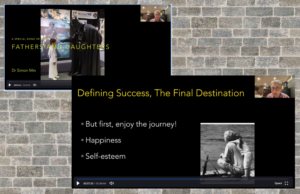Articles
Find new ways to keep communicating

“Most adolescent problems can be alleviated or rectified by correcting tensions in the parent-child relationship.” ~ Dr Ross Campbell, How to Really Love Your Teenager
Respect your child’s right to self-determination. Don’t just tell them what their goals should be. Don’t try to manipulate your child into a career path, a subject choice, musical tuition or your favourite sport. No matter how much energy it takes, engage with that young person, establish mutual admiration and respect, and nurture the internalized attitudes they will need as adults if they are not to be knocked over.
The engine room of raising teenagers is this strong parent-child rapport where issues can be discussed in intimacy, trust and depth. Foster behaviour that flows from the deepest respect for others. Without an affectionate connection you will be excluded from your teenager’s heart and oblivious to their deepest hopes and worries. Never nag. Rely on heart-to-heart conversations that help you understand what your son or daughter is thinking. This project has a tight time frame. Gone are the days, if they ever existed, when teenagers would hang off a parent’s every word.
If you are your son’s and daughter’s confidant, you can be the decisive influence in their lives
- Your relationship depends a great deal on your habits of relaxed talk in pre-teen years and on the connections you have established.
- Chat often – at least weekly one on one; the art is in the timing. Someone once said that women prefer to talk face to face, while men look in the same direction. See if it works. Be generous with your time; that is a prerequisite.
- Listen more than you talk. Remember, if you want them as adults to come asking your advice, they need to develop that habit now.
- Rely on occasional, deep heart-to-heart conversations that help you understand what your son or daughter is thinking; don’t just tell them what to think. They must reflect on what is happening and set their own goals, not your goals.
- When you have to raise difficult issues, don’t criticize from outside. Think the best of them. Don’t judge intentions, talk about the facts.
- Talk about the big issues – life and death, love and relationships, freedom, spiritual values, and love for truth.
- Open up about your own life and childhood. Teach your son or daughter to recognize his or her strengths and also shortcomings, by talking about your own battles and discoveries. Pass on the toughest life lessons you have learnt: set strong convictions and ideals rock hard in a street-wise shrewdness.
This article was written by Dr, Andrew Mullins.
He is the author of ‘Parenting for Character: Equipping Your Child for Life’, with editions in several languages.







